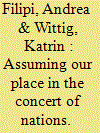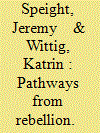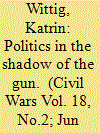|
|
|
Sort Order |
|
|
|
Items / Page
|
|
|
|
|
|
|
| Srl | Item |
| 1 |
ID:
186319


|
|
|
|
|
| Summary/Abstract |
Pierre Nkurunziza died in 2020, just a few months short of completing his tenure as the first post-civil war President of Burundi. Critics have cast him as yet another rebel-turned-politician who came to office on a promise of a democratic transformation but became progressively authoritarian, particularly during his third, disputed term in office. As a political figure, however, Nkurunziza remains poorly understood. What kind of a worldview motivated his politics? Drawing on critical discourse analysis, we identify three recurring themes in Nkurunziza's key political speeches: anti-colonialism; unity and self-sufficiency; and discourse around ‘politics of a new beginning’. These themes were stable across time, indicating Nkurunziza's consistent worldview, but became more pronounced and radical as he faced growing challenges to his legitimacy from within and without. Far from being confined to rhetoric, the themes also manifested in concrete policy decisions, underscoring the urgent need to take ideology seriously in understanding the political trajectories of African leaders.
|
|
|
|
|
|
|
|
|
|
|
|
|
|
|
|
| 2 |
ID:
157860


|
|
|
|
|
| Summary/Abstract |
Across diverse liberal war-to-peace transitions, the integration of former armed movements into the post-accord political system has been identified as a significant factor in determining the success of peace processes. There is now a growing literature focusing on rebel-to-party transformations in the aftermath of armed conflict. Despite on-going debates over the long-term implications of rebel-to-party conversions for existing party systems, actual studies focusing on diverse patterns of rebel-party configurations in post-accord transitions remain rare. This article takes a first step to fill this gap by comparing pathways in rebel-party relations in Côte d’Ivoire and Burundi. While the FN in Côte d’Ivoire joined the RDR, an established political party, with FN members running as candidates for the RDR in post-accord elections, the CNDD-FDD in Burundi formed its own party becoming the country’s current ruling party. We develop a theoretical framework analyzing these divergent pathways by exploring how ties between armed movements and pre-conflict political parties shape trajectories of rebel groups during and beyond civil war.
|
|
|
|
|
|
|
|
|
|
|
|
|
|
|
|
| 3 |
ID:
147186


|
|
|
|
|
| Summary/Abstract |
This article provides a critical review of ‘rebel-to-party transformation’ scholarship. It shows how three flawed assumptions have underpinned much of the literature: (1) an ideal-typical differentiation between rebel group and political party as distinct by their use or rejection of violence; (2) the analysis of armed conflict as breakdown of ‘normal’ politics, and the study of ‘rebel-to-party conversions’ as a gradual, natural shift from violence back to politics; (3) a failure to integrate the study of rebel legacies into an examination of broader authoritarian legacies. These assumptions have clouded our understanding of politico-military organizations in conflict-torn societies, which combine social protest, armed rebellion, political violence, and party politics throughout their history. Drawing on the ‘no peace, no war’ and ‘armed politics’ paradigms, this article revisits these assumptions through the case of Burundi.
|
|
|
|
|
|
|
|
|
|
|
|
|
|
|
|
|
|
|
|
|